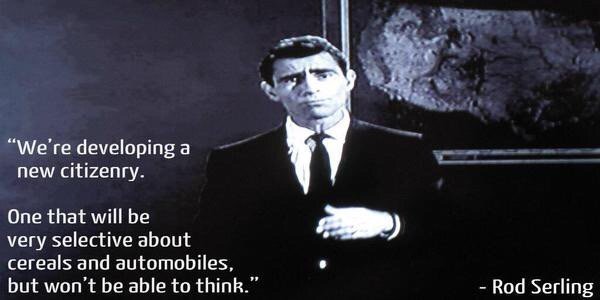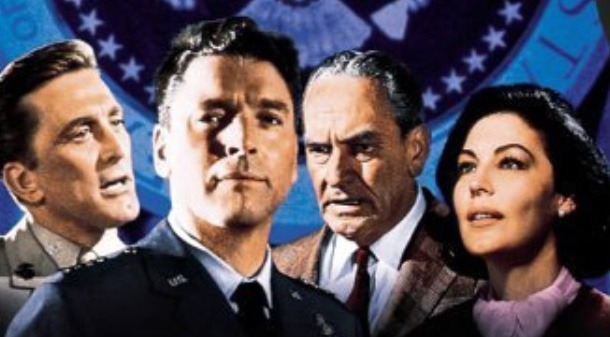Tag: Rod Serling
American Idiocracy: 50 Years Later, We’re Still Stranded in the Twilight Zone
Guest Post by John W. Whitehead
“We’re developing a new citizenry. One that will be very selective about cereals and automobiles, but won’t be able to think.”—Rod Serling
Have you noticed how much life increasingly feels like an episode of The Twilight Zone?
Only instead of Rod Serling’s imaginary “land of both shadow and substance, of things and ideas,” we’re trapped in a topsy-turvy, all-too-real land of corruption, brutality and lies, where freedom, justice and integrity play second fiddle to political ambition, corporate greed, and bureaucratic tyranny.
It’s not merely that life in the American Police State is more brutal, or more unjust, or even more corrupt. It’s getting more idiotic, more perverse, and more outlandish by the day.
Somewhere over the course of the past 240-plus years, democracy has given way to idiocracy, and representative government has given way to a kleptocracy (a government ruled by thieves) and a kakistocracy (a government run by unprincipled career politicians, corporations and thieves that panders to the worst vices in our nature and has little regard for the rights of American citizens).
Examples abound.
Continue reading “American Idiocracy: 50 Years Later, We’re Still Stranded in the Twilight Zone”
Seven Days in May
By Doug “Uncola” Lynn via TheBurningPlatform.com
As the political coup against President Donald Trump continues, I was recently reminded of a 1964 film entitled Seven Days in May starring Burt Lancaster, Kirk Douglas, Fredric March, and Ava Gardner. Paradoxically, the screenplay was written by Rod Serling, the same guy who created and narrated The Twilight Zone.
Coincidence? But I digress.
Serling’s screenplay was, in fact, based upon the novel of the same name that was written by the authors Fletcher Knebel and Charles W. Bailey II. Published during the first year of John F. Kennedy’s presidency, the book was actually read by JFK who not only shared it with those in his circle, but also encouraged the production of the film. Unfortunately, however, President Kennedy never lived to see the movie play on the big screen.
IMAGINE IF YOU WILL
ARE YOU TOUGH ENOUGH?

Rod Sterling’s was invited to speak at his former high school to the 1968 graduates of Binghamton Central High School. His words are just as relevant today as then.
______________________________
Graduates, ladies and gentlemen, faculty, friends and old acquaintances—unless you’ve reached my age and are as familiar with the taste of Serutan as you are with bourbon, it’s unlikely that you can understand what kind of bitter-sweet poignance attends the return of a man like myself to this city … this school … this room. In its aged mustiness, in its archaic ugliness, in its depressing sameness … it is nonetheless filled with ghosts and certain haunting memories that conjure up faces and names, sights and sounds, laughter and events—almost too sweet to be bearable. But, as I say, nostalgia is the privilege of the aging—and to you young graduates who have only sipped at your cup of life—I’m sure you must look upon this aging writer from the West Coast, with his hundred and forty-odd pounds of solid grizzle, and wonder, albeit patiently, what is there about a room … a terribly familiar auditorium … a study hall, a classroom, a gym that still carries with it the ingrained scent of socks and sneakers—to turn a man so wistful and so reminiscent.
Well, I’ll tell you, though I seriously doubt if you can appreciate the mood or even understand the language. I’m thinking back, now, to my own moment on this stage in 1942, when the hundred and forty pounds were then a hundred and eighteen … the hairline was unreceded … when my dear friend, Helen Foley, out there, had less gray in her hair but was no more beautiful than she is today—and when the late and beloved Henry Merz tried to explain to me why I couldn’t get into the varsity football game because he found it difficult to reconcile playing a quarterback who weighed less than the team bulldog. All these things come back now, and have during the forty-eight hours I’ve been walking these streets of my youth.
So I preface a few remarks this evening with this plea for some degree of compassion on the part of you young people. Allow him this moment of recollection and keep in mind that twenty-five years from now you may well retrace your steps as I have and come back into this ugly and beloved room and wish in your heart of hearts, as I find myself wishing, that the twenty-five years had not gone by and that they could be relived. With more wisdom, perhaps, with more farsightedness, with more logic and reason and balance—but however—to be re-lived so that the mirror would once again reveal the unlined, marvelous face of youth that looks back with no fears and no trepidations, with an acceptance of challenge and with a dedication to meet the challenge.
And this is, of course, what I’m here to talk about. Challenge. Are you tough enough—that’s the theme. That’s the question. Are you tough enough? I submit to you, young ladies and gentlemen, of all the virtues of man—toughness is the singular quality most required of you on this 28th day of January, the nineteen hundred and sixty eighth year of our Lord. Roddy—that kid of twenty-five years ago, and his contemporaries—had a few challenges of their own. World War Two. A brief lemonade after the Graduation ceremonies—and then a train to the induction centers. It was that way for most of us. But we had some things going for us that you don’t have. We had a sense of rightness. We had a sense of morality. The world had been botched up by the preceding generation—but our course was relatively clear. We were simply there to repair the damage that had been done and to make damned sure that our children would have no such chore. But … the best laid schemes o’mice and men go oft a-gley. So here, this evening, this member of a preceding generation stands in front of you by way of an apology that we did our job most improperly. We, in a sense, settled nothing and we have left you a world far more botched than the one that was left to us.











